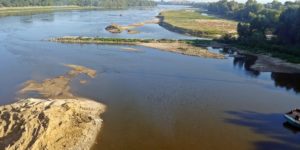On 24 July, the Warsaw-Boulevards water gauge showed that the level of Vistula was only 41 cm. On most of Polish rivers, the low levels of water are observed. What is the reason for this situation? The lack of snow cover in winter, low rainfall and high temperatures, i.e. the drought. The Polish Waters work intensively to prevent its effects.
At the beginning of June, the level of Vistula River was almost 6 m at the Warsaw-Boulevards water gauge. However, within a few days, the water floated away do the Baltic Sea together with the flood wave and now the water level in the rivers is low. The agricultural drought occurs in the majority of the country. 19 July 2019 The Polish Geological Institute – National Research Institute – acting as the Polish Hydrological Survey declared the state of emergency for August due to the lowering of the shallow layer of groundwater. The problem affects the area of eight voivodships. At the local level, the shallow wells may be run out of water. However, this concerns the so-called first water-bearing level only. The water which is necessary for life, is ensured for many years. No difficulties in the operation of deeper intakes are expected. Can these phenomena be prevented?
Yes. The Polish Waters and other national institutions take a number of actions to protect our water resources. The rain water may be retained, for example, by building small and large reservoirs which accumulate water during a flood and form the reserve for the period of drought. The large reservoirs ensure the stability of the water level in the area throughout the year. Those which benefit from their creation are the areas within a radius of several dozen kilometres around the reservoir and several kilometres on both sides of the river. In addition, in a given area, the groundwater level increases.
The large investments planned by the Polish Waters, such as Lubiąż and Ścinawa barrages on the Odra River or Siarzewo barrage on Vistula, are necessary to prevent the major Polish rives from disappearing due to the worsening of the climate conditions. The water retention not only supports citizens of the regions especially threatened by drought, but also helps rivers with regard to nature. The water reservoirs enable supplying rivers with water during the drought period when the natural, biological flow is not possible. If we have the collected water, we can release it in a controlled way to allow aquatic organisms and plants to survive. The barrages will help to restore the natural level of water in the rivers. It is worth mentioning here that Polish Waters do not plan to build the gigantic dams and reservoirs. The Siarzewo barrage will not be an extremely deep reservoir, it will be maintained within the range of the natural valley. It will be over two times smaller than the barrage existing since several decades in Włocławek.
The Polish Waters are working on the Stop the drought! project which envisages the development of the first plan for counteracting the effects of drought in Poland. The document will include, i.a. the catalogue of the necessary investments, as well as the specific recommendations for municipalities, farmers and citizens of all regions concerning the rational water management. The plan envisages the construction of small and large water reservoirs, restoration of wetlands, afforestation, provision of blue-green infrastructure in the cities. Already on 11 September, the draft plan will be submitted for public consultation. The meeting will take place in 15 major cities in Poland. The details can be found on the project website: www.stopsuszy.pl.
A number of departments are working on the issue of water scarcity in Poland and the need to protect its resources. The Ministry of Marine Economy and Inland Navigation is working on the comprehensive Retention Development Programme. It envisages the improvement of the water resources storage capacity from the current 6.5% to 15%. By 2027, the department wants to spend PLN 14 billion on investments related to the development of retention. The assumptions of the programme will be coordinated with the actions of Polish Waters and other institutions.
In agreement with Polish Waters, the Ministry of Agriculture and Rural Development prepares the pilot programme entitled: “Modernisation of agricultural holdings”. It will be aimed at co-financing the agricultural holdings of 300 ha. The grants will be provided, i.a. for the construction of wells, purchase of new machines and equipment designed for water extraction, storage and recovery. The programme is to start in September this year.
The retention measures are also taken by the State Forests which implemented two programmes related to the restoration of small retention on lowlands and in mountain areas and they plan to implement next project in the nearest future. So far, several thousand of dams, small ponds and other structures which help store as much as 45 million m3 of water have been built as part of both programmes of the State Forests.
We should remember that different types of measures are necessary to prevent the drought. They are all focused on the retention of water particularly in the place where it fell as rain. This makes its outlet to streams and rivers slower. The retained water remains in local environment longer, it feeds the ground and prevents the drought. It should also be remembered that in principle, small and high retention protects not only against the drought effects, but it also prevents flooding and floods.
When fighting against the drought effects, the Polish Waters join forces with national institutions, research institutes, universities, local governments, non-governmental organisations and citizens. The comprehensive measures are necessary. Some of them, such as, for example, collecting rainwater for own needs, may be implemented quickly at a low cost. Other are long-term. The environmental education is also important to develop new, balanced approach to water management.
View of the Vistula River from Gdański Bridge in Warsaw, July 2019. Photo: Polish Waters




Hi there, just became alert to your blog through Google, and
found that it is truly informative. I’m going to watch out for brussels.
I will be grateful if you continue this in future. Many people will be benefited from your writing.
Cheers! Escape rooms hub
You have remarked very interesting details! ps decent site.?